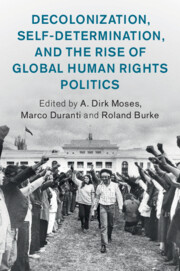Book contents
- Decolonization, Self-Determination, and the Rise of Global Human Rights Politics
- Human Rights in History
- Decolonization, Self-Determination, and the Rise of Global Human Rights Politics
- Copyright page
- Contents
- Notes on Contributors
- Acknowledgments
- Introduction
- Part I Anti-Colonial Struggles and the Right to Self-Determination
- Part II Postcolonial Statehood and Global Human Rights Norms
- Part III Colonial and Neocolonial Responses
- 11 The Inventors of Human Rights in Africa
- 12 “A World Made Safe for Diversity”
- 13 Between Humanitarian Rights and Human Rights
- 14 The End of the Vietnam War and the Rise of Human Rights
- 15 Decolonizing the Geneva Conventions
- 16 Liberté sans Frontières, French Humanitarianism, and the Neoliberal Critique of Third Worldism
- Index
11 - The Inventors of Human Rights in Africa
Portugal, Late Colonialism, and the UN Human Rights Regime
from Part III - Colonial and Neocolonial Responses
Published online by Cambridge University Press: 24 June 2020
- Decolonization, Self-Determination, and the Rise of Global Human Rights Politics
- Human Rights in History
- Decolonization, Self-Determination, and the Rise of Global Human Rights Politics
- Copyright page
- Contents
- Notes on Contributors
- Acknowledgments
- Introduction
- Part I Anti-Colonial Struggles and the Right to Self-Determination
- Part II Postcolonial Statehood and Global Human Rights Norms
- Part III Colonial and Neocolonial Responses
- 11 The Inventors of Human Rights in Africa
- 12 “A World Made Safe for Diversity”
- 13 Between Humanitarian Rights and Human Rights
- 14 The End of the Vietnam War and the Rise of Human Rights
- 15 Decolonizing the Geneva Conventions
- 16 Liberté sans Frontières, French Humanitarianism, and the Neoliberal Critique of Third Worldism
- Index
Summary
In 1967, twelve years after Portugal’s admission to the UN, Franco Nogueira, the Portuguese Minister of Foreign Affairs and one of the most important advocates of the multiple doctrines of exceptionality that governed the Portuguese postwar imperial ideology, stated that the Portuguese were solely responsible for the spread of the “notion of human rights and racial equality” in Africa. Speaking six years after the beginning of conflicts in Angola and ongoing racial discrimination across what Portugal termed its “overseas provinces” the idioms and repertoires of citizenship and human and social rights were appropriated in a particular way by the Portuguese authorities. This chapter investigates the embrace and deployment of human rights discourse by the Portuguese authoritarian empire. The study of the Portuguese case enables an additional understanding of the variegated historical dynamics, temporalities, and impacts of the human rights regime, providing another example, an understudied one, of the historical intersections of the global debates on human rights and national and imperial politics and policies.
Keywords
- Type
- Chapter
- Information
- Publisher: Cambridge University PressPrint publication year: 2020
- 6
- Cited by

